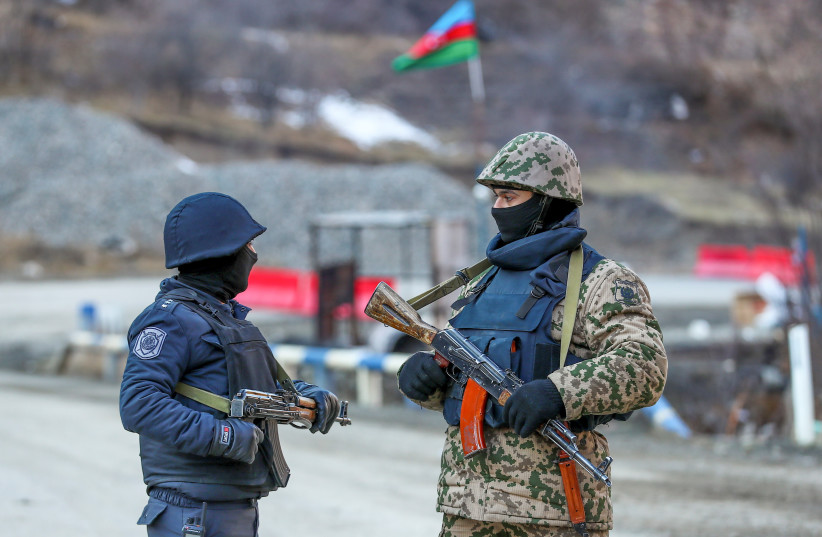Azerbaijan's State Security Service announced on Tuesday that it had arrested a group of Azerbaijani citizens who had been trained and funded by Iran's intelligence service in order to act against the interests of Azerbaijani national security.
According to the Azerbaijani agency, the illegal armed group was secretly formed by Iran's special intelligence service through the inculcation of "radical-extremist religious ideas."
The members of the group, called the Muslim Unity Movement, were taken through various countries to Tehran and Syria in order to undergo military training and receive funding.
The group also brought books and videos which propagated "radical, religious-extremist attitudes against the ideas of modern development and a secular state."
One of the suspects was arrested while "attempting a terrorist act" in a different country, according to the Azerbaijani State Security Service.

Relations between Azerbaijan, Iran tense
Relations between Azerbaijan and Iran have been tense in recent years, amid Azerbaijan's conflict with Armenia, close ally of Iran's.
In September, multiple editorials in Azerbaijani media called on ethnic Azerbaijanis in northern Iran to try separating from Iran, with Iranian officials warning against foreign efforts to disrupt relations between the two countries.
The articles cited a Turkish report by the Turkish Yeni Safak news site, linked to the Turkish government, which claimed that a former Iranian diplomat named Ebulfezl Zuhtevend made "scandalous statements" about Turkey and Azerbaijan in audio recordings.
Despite the articles, Azerbaijani officials have stressed that relations with Iran are still strong.
Last year, tensions spiked between Azerbaijan and Iran after Azerbaijan began targeting Iranian trucks with fines and arrests, and Iran moved military forces to the border and warned against Israeli influence near its borders.
Ahmed Ali Goudarzi, commander of Iran's Border Guard, claimed at the time that Israeli forces are present in "sensitive areas" in neighboring countries and conducting intelligence and espionage work, advising Muslim countries "not to allow this," according to Iranian state broadcaster IRIB.
The commander additionally claimed that Israel incited neighboring countries to take action concerning their borders or impose large tolls on heavy vehicles, an apparent reference to fees imposed on Iranian truck drivers by Azerbaijan.
Iranian Foreign Minister Hossein Amir-Abdollahian also claimed that Israel had a presence along the Azerbaijani-Iranian border, saying "the Zionist regime has started provocative actions in our region through the territory of Azerbaijan. We consider some of the harsh statements made by the Azerbaijani authorities these days to be unconstructive."
Azerbaijan's State Border Service (SBS) rejected the claims, saying that Azerbaijan "does not need the support of foreign forces."
Mousavi had a hand in the tensions then, claiming in an interview with Al-Mayadeen news that there were 1,000 Israeli operatives and 1,800 ISIS ones in Azerbaijan and that Israelis with advanced equipment in Azerbaijan played a role in the assassination of Iranian nuclear scientist Mohsen Fakhrizadeh.
Iran launched the “Conquerors of Khaybar” exercise amid the tensions near the border with Azerbaijan. The name was a seeming reference to the Battle of Khaybar in 628 CE, when Muslims, led by Muhammad, fought against the Jews there, eventually defeating and imposing a tax on them.
Iranian officials stressed that the exercise was meant to “send a message” to Israel and ISIS, warning that Tehran will take any action necessary to defend its borders.
At the time, Azerbaijani President Ilham Aliyev expressed shock at Iran’s decision to hold a military exercise along its border, saying it was the first time in Azerbaijan’s 30-year history of independence that this had occurred.
Close ties between Israel and Azerbaijan
Azerbaijan and Israel have close ties, with the president of Azerbaijan saying in a discussion with the Nizami Ganjavi International Center in May that relations with Israel were very diverse and were especially strong in the defense industry. “It is no secret that Azerbaijan has full access to Israeli defense industry products,” Aliyev said at the time.
Israeli arms, including the LORA missile and the Israel Aerospace Industries Harop suicide drone, were reportedly used by Azerbaijan in the Nagorno-Karabakh war with Armenia in 2020.
